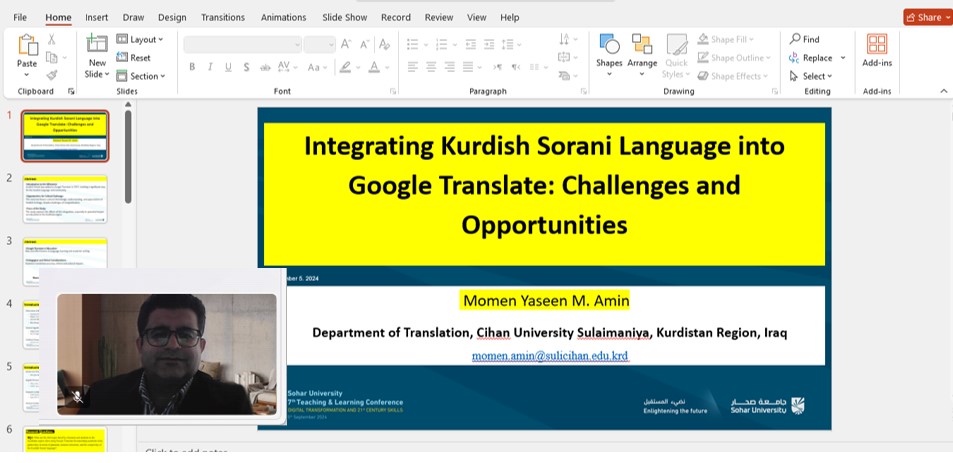
Dr. Momen Yaseen M. Amin, Head of the Translation Department at Cihan University Sulaimaniya, presented a groundbreaking paper at the 7th Teaching and Learning Conference at Sohar University, Oman. His paper, “Integrating Kurdish Sorani Language into Google Translate: Challenges and Opportunities,” explored the impact of Kurdish Sorani’s inclusion in Google Translate, highlighting both the benefits and challenges faced by educators and students in the Kurdistan region.
Presentation of Research
Dr. Momen Yaseen M. Amin’s presentation focused on the inclusion of Kurdish Sorani in Google Translate, a significant development for the Kurdish language. Introduced in 2022, this integration is a milestone that has opened up new opportunities for global accessibility and cross-cultural understanding. Dr. Momen’s research delved into how this inclusion can impact language education in the Kurdistan region, providing both opportunities and obstacles for educators and students alike. The research raised key questions, such as the challenges faced by students and educators when using Google Translate for academic texts and the impact of this tool on the globalization of the Kurdish language.
Challenges in Using Google Translate
Dr. Momen highlighted several challenges associated with using Google Translate for Kurdish Sorani. One of the most prominent issues is vocabulary. Kurdish Sorani contains specialized terms in fields like science, law, and medicine that Google Translate does not always recognize, leading to incomplete or inaccurate translations. This can be problematic for students and educators, particularly in academic and professional contexts. Grammar is another major concern, as Google Translate often struggles with the complexity of Kurdish Sorani’s grammatical structures. Verb forms, noun cases, and sentence constructions frequently lead to translation errors, which may confuse learners or misrepresent the intended meaning.
Dr. M. Amin also discussed the issue of cultural nuances. Kurdish Sorani idioms and cultural references are often mistranslated or not understood by Google Translate, resulting in a loss of meaning. This presents significant challenges for students relying on accurate translations for comprehension and research.
Opportunities for Language Advancement
Despite the challenges, Dr. Momen’s research identified several opportunities presented by the integration of Kurdish Sorani into Google Translate. One of the major benefits is increased accessibility for Kurdish speakers worldwide. Students and educators can now translate texts between English and Kurdish Sorani more easily, which can aid in language learning and academic research. Google Translate also enhances language proficiency. By using it as a tool, students can compare their translations with machine-generated ones, allowing them to identify areas for improvement in grammar and vocabulary. This contributes to improved language skills and understanding of both English and Kurdish Sorani. Additionally, the integration promotes cross-cultural understanding by allowing users to translate texts between languages, facilitating greater appreciation for Kurdish culture globally.
A Step Forward with Caution
The faculty member of Cihan University Sulaimaniya concluded that while Kurdish Sorani’s inclusion in Google Translate marks a significant step forward, it should be used as a supplementary tool rather than a primary source for translation. Human oversight remains essential to ensure accuracy, especially in academic and professional contexts. As technology continues to evolve, further efforts are needed to enhance translation quality and develop a comprehensive language policy that supports the continued growth and advancement of the Kurdish language in educational settings.







